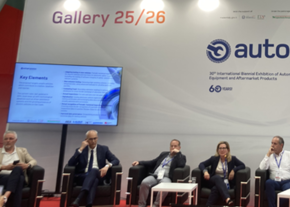
24/02/2020
Battle for data
Massimo Brunamonti
Work-in-progress for Egea at EU level to ensure direct and non-discriminatory access to vehicle data and vehicle functions for the entire repair sector
Dave Garratt, President of Egea, the European Garage Equipment Association, of which Aica is a member, called it "The Battle for Data", referring to the ongoing activities both in Brussels and in a number of EU member countries, to ensure direct and non-discriminatory access to vehicle data and functions for the entire repair sector. There is no doubt that this is a real battle even if bloodless, fortunately, with independent repairers and car manufacturers on opposite sides at a time when legislators are called upon to decide if and which rules to adopt for connected cars.
Recent meetings at Dg Grow in Brussels have clearly brought this difference of views to the fore, to the extent that the European Commission has decided to extend consultations in an attempt to find a mutually accepted solution. The topic is rather complex and, at least for the independent repair sector, goes beyond connected cars and involves free access through Obd ports, the very reason for the ongoing clash between car-repairers and car manufacturers, with the latter justifying the introduction of access barriers with the need for "cybersecurity" as protection against possible attacks that could go as far as jeopardizing road safety. True: connected cars and assisted driving (and autonomous in the not too distant future), have an extreme need of cybersecurity without which our vehicles could turn into “weapons of mass destruction”. However, digital security and free access policies are far from incompatible, as widely demonstrated in many other applications, of equally sensitive nature, such as, for example, the movement of money.
This is exactly what Egea claims: in a secure IT environment, it is technically possible, if desired, to regulate and administer access to vehicles in such a way as to prevent erroneous, illegal or downright criminal operations without penalising the entire independent car repair sector at the same time. This, in a nut shell, is what Egea is demanding from legislators: to regulate and possibly standardise access to data where necessary or desirable. The Commission itself had made positive steps in this direction, as evidenced by an announcement made last spring, which presented an official proposal for the adoption of the Iso 18541 standard (standard for repair and maintenance information - RMI) and the Sermi accreditation scheme in European legislation. The Sermi protocol, in particular, could be the solution to the problem of access authorization, guaranteeing lawful behaviours and legitimacy through accreditation, guaranteeing the necessary traceability of operations.
Recent meetings at Dg Grow in Brussels have clearly brought this difference of views to the fore, to the extent that the European Commission has decided to extend consultations in an attempt to find a mutually accepted solution. The topic is rather complex and, at least for the independent repair sector, goes beyond connected cars and involves free access through Obd ports, the very reason for the ongoing clash between car-repairers and car manufacturers, with the latter justifying the introduction of access barriers with the need for "cybersecurity" as protection against possible attacks that could go as far as jeopardizing road safety. True: connected cars and assisted driving (and autonomous in the not too distant future), have an extreme need of cybersecurity without which our vehicles could turn into “weapons of mass destruction”. However, digital security and free access policies are far from incompatible, as widely demonstrated in many other applications, of equally sensitive nature, such as, for example, the movement of money.
This is exactly what Egea claims: in a secure IT environment, it is technically possible, if desired, to regulate and administer access to vehicles in such a way as to prevent erroneous, illegal or downright criminal operations without penalising the entire independent car repair sector at the same time. This, in a nut shell, is what Egea is demanding from legislators: to regulate and possibly standardise access to data where necessary or desirable. The Commission itself had made positive steps in this direction, as evidenced by an announcement made last spring, which presented an official proposal for the adoption of the Iso 18541 standard (standard for repair and maintenance information - RMI) and the Sermi accreditation scheme in European legislation. The Sermi protocol, in particular, could be the solution to the problem of access authorization, guaranteeing lawful behaviours and legitimacy through accreditation, guaranteeing the necessary traceability of operations.








